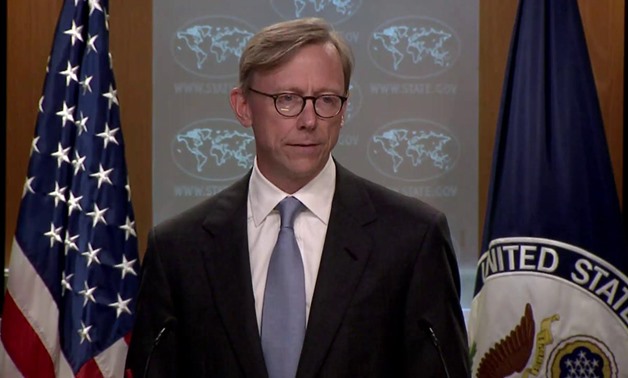
U.S. Special Representative for Iran Brian Hook - Photo courtesy of US State Department
CAIRO – 7 November 2018: The Iranian regime’s attempts to mischaracterize humanitarian exemptions in the US sanctions are “pathetic effort to distract from its own corruption and mismanagement,” U.S. Special Representative for Iran Brian Hook told journalists in a teleconference Monday.
The United States announced Monday it reinstated all sanctions lifted under the 2015 denuclearization deal, vowing to put more pressure by zeroing its Iranian oil imports.
Ahead of the re-imposing of what President Donald Trump has described as the “strongest sanctions the US ever issued,” the administration has been challenging the Iranian approach to describe the American decision as targeting people.
Hook, also a Senior Policy Advisor to the Secretary of State, said that targeting humanitarian trade with Iran has never been of US policy, and that the sanctions exempt humanitarian goods, food and medicines.
In the same context, he further accused Iran’s regime of robbing its people as it spends billions of dollars to support militant groups in the region rather than investing in the Iranians.
“The Iranian people have had 39 years of economic mismanagement. They know very well that their economic problems are caused by this regime. They know that they are not caused by the United States. And I think people should be careful not to confuse causation with correlation,” he added.
In his briefing, Hook said that the main purpose of this economic pressure is that Tehran never acquires a nuclear weapon, and to end its broad range of ‘malign’ activities in the Middle East.
With more than 20 countries already zeroed their imports of Iranian oil and 100 major companies withdrew businesses from Tehran leading to tens of billions in dollar of lost investment, Hook assured an enormous support from countries to the US pressure campaign against Iran.
According to him, the US sanctions have taken off the market around 1 million barrels of Iranian oil, reducing the regime’s revenues by 2 billion dollars. However, he said that this gap will be covered by substituting Iranian crude for other crude oil producers have all increased their production like The United States, Iraq, Saudi Arabia, and Russia. He added that they will ensure this happened without increasing the price of oil.
A BBC video, reported from Beirut, where Iranians there felt the sanctions’ effect, has featured the everyday products that will be hit by these penalties, including: vehicles, Argan oil and carpets.
In the anticipation of the imposed sanctions, observers have questioned whether these penalties will be effective in achieving their goal of changing Iranian policies.
On the other hand, Hook seemed assured that Iran’s historical record since 1979 says it responds to significant economic pressure, saying “we have every reason to believe that Iran will come back to the negotiating table at some point.”
He also said, “We will impose maximum economic pressure on this regime until it changes this behavior, and stops being a key driver of global instability and terror.”

Comments
Leave a Comment